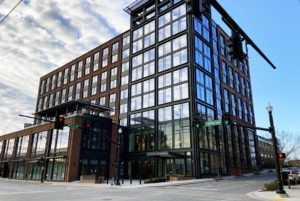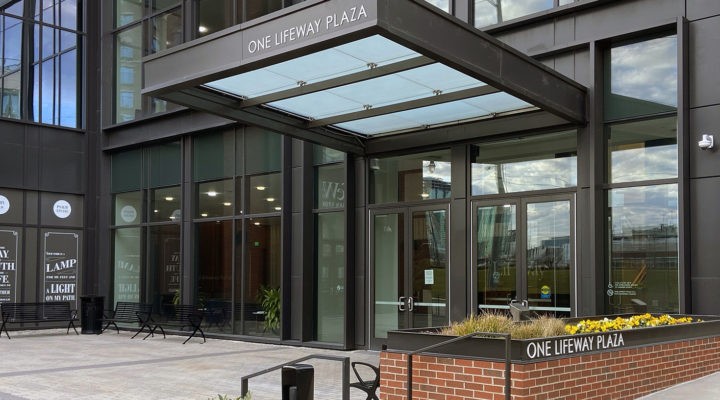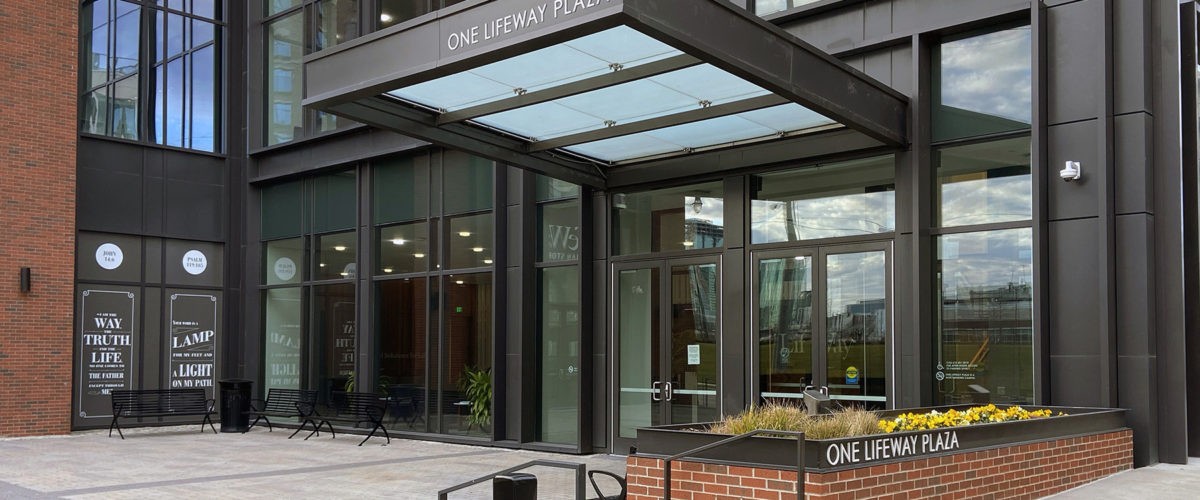Lifeway Christian Resources has entered into contract to sell the $100 million corporate headquarters it built and occupied in 2017.
The Nashville, Tenn.-based publisher of curriculum, books, Bibles and other Christian educational resources began to study the viability of the 277,000-square-foot facility in 2019 — less than two years after selling its enormous downtown Nashville property for $125 million.
By 2020, daily occupancy of the new smaller facility had dropped to 60% of capacity. The coronavirus outbreak showed that its existing work-from-home practices could be effective beyond the pandemic, leaders said.

Ben Mandrell
“This has led us to think strategically about selling our large building downtown, fully embracing remote work as the norm, and moving into a new era of creative and collaborative work,” Lifeway President and CEO Ben Mandrell said in the announcement.
“We are moving away from the idea of a ‘headquarters’ to a fully mobile and agile workforce that intentionally gathers to build strong relationships, celebrate what God is doing and share ideas,” he said.
The company will continue to use a portion of the facility until a new location is found.
Fresh vision and an effort to embrace technology were cited as drivers when the company broke ground for its current home in 2016. Then-CEO Thom Rainer participated in the Nov. 27, 2017, ribbon cutting ceremony celebrating the new space for 1,100 corporate employees and a Lifeway Christian Store in the heart of Nashville’s thriving downtown.

The current Lifeway headquarters in downtown Nashville cost about $100 million to construct, furnish and occupy.
The company has been undergoing a series of other transformations where its properties and operations are concerned.
In 2019, Lifeway sold its distribution center in Lebanon, Tenn., for $20 million and began leasing back the warehouse and distribution space.
As the coronavirus pandemic swept the globe, Lifeway in April 2020 announced it would cut $25 million to $30 million of recurring expenses from its operating budget. That included layoffs, a freeze on discretionary spending and salary reductions for top executives. Lifeway began the 2020 fiscal year with a budget of $281.3 million.
In late December, Lifeway announced it had finalized the sale of Ridgecrest Conference Center and Summer Camps in North Carolina to a nonprofit group created to maintain the 1,200-acre property as a Christian camp and conference facility.
In 2014, Lifeway sold its 2,400-acre Western U.S. conference center, Glorieta, to a nonprofit camping organization for $1.
In 2019, the company closed its 170 brick-and-mortar Lifeway Christian Store locations and moved its retail business online, reporting that the retail business had lost nearly $50 million from 2014 to 2019.
“Our retail strategy for the future will be a greater focus on digital channels, which are experiencing strong growth,” then-acting President and CEO Brad Waggoner said in a news release. “Lifeway is moving into a new era with a strategic digital focus that will prepare us for the future and allow us to better serve our customers.”
Innovation now is driving the sale of Lifeway’s corporate headquarters, officials explained.
“We’re definitely moving to a new work environment,” Mandrell said. “Our new space will be designed specifically around a healthy blend of strategic meetings and team collaboration, as well as the flexibility of working from home. Like other companies are doing as a result of COVID, we’re re-imagining the corporate office for the future of work.”
Lifeway found success with work-at-home policies even before the pandemic, Chief Human Resources Officer Connia Nelson said.
“Before Lifeway moved to Capitol View, we saw the need to support an increasingly mobile workforce,” she said. “We’ve had a robust work-from-anywhere strategy for the last few years, which positioned us well for Nashville’s safer-at-home orders put in place in March.”
A feasibility study looked at options other than selling the building, Lifeway said. Those included leasing floors to outside occupants or selling the building and then leasing back spaces. The decision to sell and eventually move was the necessary choice, Mandrell said.
“We want to be wise stewards, so it makes sense for us to do all we can to make the best use of our resources, including our corporate office building. The decision to sell our building is a strategic one.”


